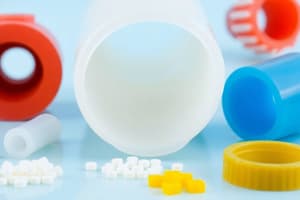Podcast
Questions and Answers
What type of polymer is vulcanized rubber?
What type of polymer is vulcanized rubber?
- Thermosetting polymer (correct)
- Elastomeric polymer
- Biodegradable polymer
- Thermoplastic polymer
Which type of bond is universally common in all polymers?
Which type of bond is universally common in all polymers?
- Covalent bond (correct)
- Metallic bond
- Ionic bond
- Van der Waals force
Cotton is an example of which type of polymer?
Cotton is an example of which type of polymer?
- Amorphous polymer
- Addition polymer
- Condensation polymer (correct)
- Synthetic polymer
What characteristic allows many polymeric materials to be elastic?
What characteristic allows many polymeric materials to be elastic?
When a diacid reacts with a diol, what product is formed along with water?
When a diacid reacts with a diol, what product is formed along with water?
Which of the following best describes LDPE?
Which of the following best describes LDPE?
Which of the following is not considered a man-made polymer?
Which of the following is not considered a man-made polymer?
What do the monomers chloroethene and ethene form when combined?
What do the monomers chloroethene and ethene form when combined?
What is a requirement of monomers in order to undergo addition polymerization?
What is a requirement of monomers in order to undergo addition polymerization?
Which statement is NOT TRUE about thermosetting polymers?
Which statement is NOT TRUE about thermosetting polymers?
Which type of polymer is Nylon classified as?
Which type of polymer is Nylon classified as?
Why is there no isotactic or syndiotactic form of polyethylene?
Why is there no isotactic or syndiotactic form of polyethylene?
What is lost when two monomers join together via a condensation reaction?
What is lost when two monomers join together via a condensation reaction?
Which polymer structure is known to be strong?
Which polymer structure is known to be strong?
What is Teflon commonly used for?
What is Teflon commonly used for?
What is a polymer?
What is a polymer?
Flashcards
Polymerization
Polymerization
The process by which small molecules called monomers join together to form large molecules called polymers.
Addition Polymerization
Addition Polymerization
A type of polymerization where monomers with a carbon-carbon double bond react to form a long chain polymer.
Condensation Polymerization
Condensation Polymerization
A type of polymerization where monomers join together with the loss of a small molecule, such as water.
Isotactic Polymer
Isotactic Polymer
Signup and view all the flashcards
Syndiotactic Polymer
Syndiotactic Polymer
Signup and view all the flashcards
Alternating Polymer
Alternating Polymer
Signup and view all the flashcards
Thermoplastic Polymer
Thermoplastic Polymer
Signup and view all the flashcards
Thermosetting Polymer
Thermosetting Polymer
Signup and view all the flashcards
Covalent bond
Covalent bond
Signup and view all the flashcards
Elasticity in polymers
Elasticity in polymers
Signup and view all the flashcards
Addition polymer
Addition polymer
Signup and view all the flashcards
Condensation polymer
Condensation polymer
Signup and view all the flashcards
Study Notes
Polymer Types and Properties
- Vulcanized rubber: Thermosetting polymer
- Common polymer bond: Covalent bond
- Cotton: Condensation polymer
- Polymer elasticity: Due to amorphous solid structure
- Diacid + diol reaction: Ester and water
- Polypropylene (PP): Thermoplastic polymer
- Polyethylene (PE): Thermoplastic polymer
- High PVA glass transition: Hydrogen bonding
- Thermoplastic polymer characteristics: Melts or deforms on heating; shaped; chains interact via intermolecular forces
- Low-density polyethylene (LDPE): Addition polymer
- Man-made polymers: Polypropylene, polyurethane, Teflon
- Natural polymers: Wood, silk, wool
- Vinyl monomer: Ethene
- Block copolymer: Side chains of one polymer attached to a backbone of a different polymer
- Addition polymerization requirement: Carbon-carbon double bond
- Nylon: Condensation polymer
- Polypropane forms: (Specific forms A, B, C, D are not defined in the context, so a detailed explanation can't be provided)
- Thermosetting polymer characteristics: Increased strength; chains tied by chemical bonds; heated to set structure; maintain shape, strong upon heating
- High-density polyethylene (HDPE): Higher volume than LDPE
- Phenylethene monomer: Not directly followed by any resulting polymer identification
- Condensation reaction products: Not directly detailed
- Strong polymer structure: Linear structure
- Polyethylene isomers: Symmetrical monomer
- Definition of polymer: A large molecule made by monomers
- Teflon application: Non-stick surfaces
- Plastic starting material: Petroleum or oil
- Isotactic polypropane form: (Specific form A, B, C, D is not defined, so a detailed explanation can't be provided)
- Condensation polymerization loss: Water
Polymerization Types
- Addition polymerization: Monomers with carbon-carbon double bonds join
- Condensation polymerization: Monomers join, releasing small molecules (e.g., water)
Other Polymer-Related Concepts
- Polymer structure: Linear, branched, ring
- Polymer isomerism: Isotactic, syndiotactic, atactic
- Polymer properties: Elasticity, strength, melting point, density, surface area, shape, and durability
Studying That Suits You
Use AI to generate personalized quizzes and flashcards to suit your learning preferences.



